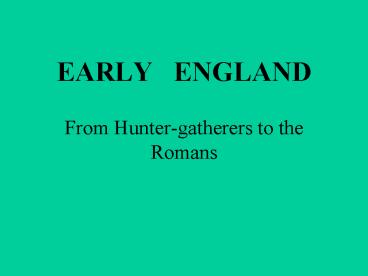EARLY ENGLAND From Hunter-gatherers to the Romans PowerPoint PPT Presentation
1 / 21
Title: EARLY ENGLAND From Hunter-gatherers to the Romans
1
EARLY ENGLANDFrom Hunter-gatherers to the
Romans
2
The evolution of the British IslesThe
geological stages of the formation of the island
(reflected in the present landscape)
3
2700 mln. years agoVolcanic eruptions Rocks
in the Scottish Highlands
4
mln. years ago-seas covered the south of
Britain
5
Later alternation of floods and drying outs
(growing forests, swamps)rottening of
vegetationpeat formed and compressedcoal in
S.Wales, Yorkshire, Kent, N.England
6
280-200 mln. years ago Britain was a desert
7
150 mln. Years ago plants and animals
appeared again
8
70 mln. Years agoseas at the highest level
Britain was blanketed by the fragments of algae
CHALK(up to 500 m thick in some places white
cliffs of the s. coast)
9
2,5 mln. years ago succession of ice ages
(12)Average temp. 6-9 C(As far as to
London)Signs of erosion in the Lake District,
Snowdonia, Scottish Highlands
10
MAN APPEARED
11
Old Stone Age (Paleolithic)70,000-8000 BC
- Alternation of warm and ice-age conditions
- For most Britain is glaciated
- Sea level is low. Land-bridges between England
and Europe. People could walk to and from the
continent. - Hunters-gatherers. Lived in caves. No cave art
- The only evidence stone tools (flint axes)
12
Middle Stone Age (Mesolithic)8300 3500 BC
- Climate warmer, glaciers retreated. Britain is an
island. - Hunters-gatherers started to settle for longer
periods in Britain. - Communities began to hunt in localised areas
- Regional trends
13
New Stone Age (Neolithic)3500-2500BC
- Introduction of agriculture (cultivation of crops
and domestication of animals) - Permanent settlement
- Trade
- Clearance of forests
- Depended on communal effort
- Mines (to get flint)
- A cult of the dead communal burials
14
Bronze Age2500-700 BC
- Increased inequality between the rich and the
poor - Communal burials replaced with individual graves
- Beaker People
- Chiefdoms and ornaments of power
- Farming (horse-riding equipment. Wheel?)
15
Stone Circles
- Over 900 in the British Isles
- The original purpose is unclear
- Hypotheses
- For ceremonies
- As trading places
- As ancient observatories
- Location the Lake District, the Lands End and
Wiltshire Downs (Avebury, Silbury Hill and
Stonehenge)
16
Stonehenge
17
(No Transcript)
18
(No Transcript)
19
(No Transcript)
20
(No Transcript)
21
(No Transcript)

